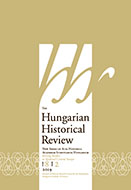“It Is an Unpatriotic Act to Flee”: The Refugee Experience after the Treaty of Trianon. Between State Practices and Neglect
“It Is an Unpatriotic Act to Flee”: The Refugee Experience after the Treaty of Trianon. Between State Practices and Neglect
Author(s): Balázs AblonczySubject(s): Pre-WW I & WW I (1900 -1919), Interwar Period (1920 - 1939)
Published by: Magyar Tudományos Akadémia Bölcsészettudományi Kutatóközpont Történettudományi Intézet
Keywords: refugees; Trianon Peace Treaty; state administration; government; memory
Summary/Abstract: In the wake of World War I, the collapse of the Habsburg Monarchy and creation of new political borders in accordance with the peace treaties prompted more than 400,000 people from the lost territories to seek refuge in Hungary. In this essay, I map the policies adopted by the Hungarian state in its efforts to integrate and pacify refugees, but also at times to discourage refugees from coming to Trianon Hungary. These policies were implemented with the participation of ministries, refugee organizations, large state-run enterprises, and municipal councils. I also interpret the various strategies used by individual actors in these processes. Taken together, the policies and strategies adopted by the state demonstrate the de facto prolongation of wartime administrative practices and offer examples of how the state turned against its own Christian, nationalist, and authoritarian ideology in the course of its efforts to keep prospective refugees from entering post-Trianon Hungary. How the questions raised by the refugee crises were tackled in the country was conditioned by multiple considerations and perspectives. The ambiguities of the policies that were adopted explain in part the long silence that has fallen over the issue of post–World War I refugees in Hungary.
Journal: The Hungarian historical review : new series of Acta Historica Academiae Scientiarum Hungaricae
- Issue Year: 9/2020
- Issue No: 1
- Page Range: 69-89
- Page Count: 21
- Language: English

